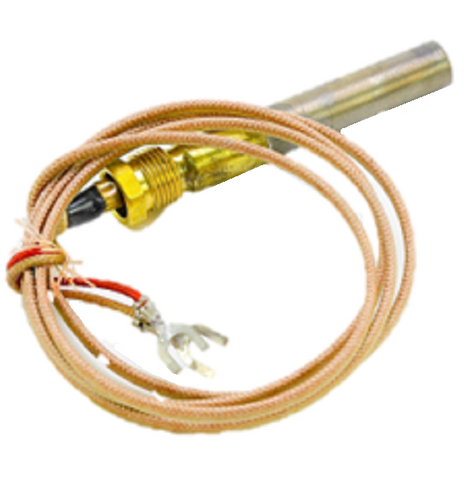
Robertshaw 1950-532 Thermopile
THERMOPILE,2 LEAD,36"
Robertshaw 1950-532 Thermopile – 36" Lead, 2-Wire Spade Connector, 250–750mV Output
The Robertshaw 1950-532 Thermopile is a reliable and high-quality pilot generator designed for use in self-powered gas control systems. With a 36-inch lead and two-wire spade connectors, this thermopile ensures dependable flame detection and ignition for a wide range of gas appliances, including furnaces, water heaters, and commercial cooking equipment.
Part of the trusted Robertshaw 1950 Series, this thermopile (also known as TP-75) converts thermal energy from a pilot flame into electrical energy (250–750 millivolts) to power gas control systems. Its stainless steel outer jacket resists heat blistering and extends lifespan, while the copper-nickel alloy construction ensures excellent conductivity and durability.
Key Features:
-
Model: 1950-532
-
Brand: Robertshaw®
-
Series: 1950 Series Thermopile (TP-75)
-
Function: Flame detection and pilot light operation for gas appliances
-
Lead Length: 36 Inches
-
Connection Type: Two-Lead Spade Connectors
-
Electrical Output: 250mV to 750mV AC
-
Material: Stainless Steel Jacket, Copper/Nickel Alloys
-
Includes: PG9 Pilot Adapter for easy installation
-
Mounting: Threaded nut for secure burner installation
-
Safety Feature: Shuts off gas flow if pilot flame is not detected
-
Certifications: RoHS Compliant
-
Warning: Contains lead (California Prop 65 compliant)
Applications:
-
Self-powered gas control systems
-
Gas furnaces and boilers
-
Water heaters
-
Commercial kitchen appliances
-
HVAC systems requiring millivolt ignition systems
Note: Product image is for reference only and may not represent the exact model.
The Robertshaw 1950-532 is a trusted replacement part compatible with many OEM and competitive thermopiles, offering long-lasting performance and safety assurance in critical gas control environments.
QUESTIONS & ANSWERS
Have a Question?
Be the first to ask a question about this.
